Ebola volunteers wrestle with quarantine mandates
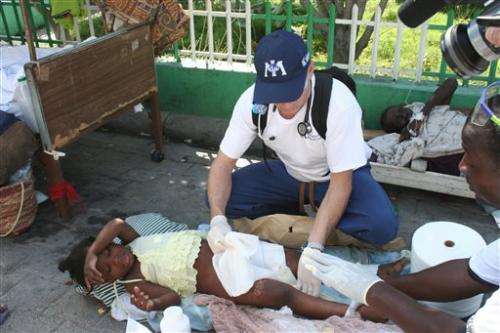
Dr. Robert Fuller didn't hesitate to go to Indonesia to treat survivors of the 2004 tsunami, to Haiti to help after the 2010 earthquake or to the Philippines after a devastating typhoon last year. But he's given up on going to West Africa to care for Ebola patients.
He could make the six-week commitment sought by his go-to aid organization, International Medical Corps. But the possibility of a three-week quarantine afterward adds more time than he can take away from his job leading UConn Health Center's emergency department.
"I'm very sad that I can't go, at this point," said Fuller. Nine weeks or more "gets to be a pretty long time to think about being away from your family and being away from your job."
As Ebola-related quarantine policies have arisen around the United States, some health workers are reassessing whether they can be among the hundreds that officials say are needed to fight the outbreak.
New rules arose so rapidly that nurse Kaci Hickox was sequestered in a medical tent for days because New Jersey announced new regulations the day she flew back from Sierra Leone. Some aid workers wonder whether they'll be able to go home for the holidays.
Aid organizations say it's too soon to tell whether quarantine rules are significantly shrinking the number of volunteers, but the measures are complicating an already challenging search for help treating a disease that has killed nearly 5,000 people, including about 310 health care workers.
New Jersey nurse Andrew Wegoye volunteered last month to go to West Africa with AmeriCares after seeing earlier outbreaks strike his native Uganda. New Jersey set its quarantine rules shortly before he left. But he didn't question his plans.
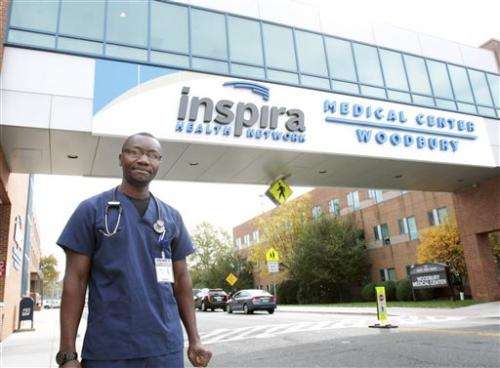
"Because being in quarantine for 21 days is nothing compared to people dying here without supportive care to help them see another day," Wegoye said by phone this week from Monrovia, Liberia.
Ebola can be transmitted by direct contact with patients' bodily fluids after symptoms start. The federal Centers for Disease Control and Prevention recommend that anyone who's had such contact undergo monitoring and avoid crowds during the 21-day window for developing Ebola.
But several states have gone further, requiring or requesting three weeks of sequestration.
Aid groups say such policies treat humanitarians like criminals, stigmatize people who aren't sick and aren't grounded in science.
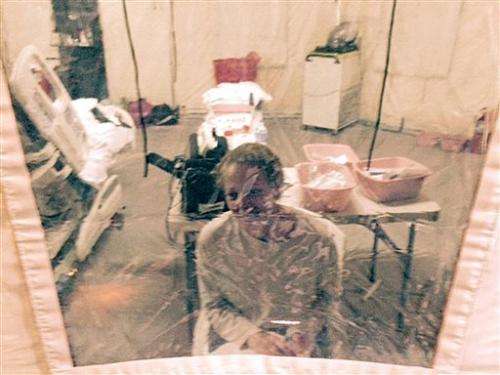
International Medical Corps is weighing whether to send longer-term volunteers to other countries, instead of back home to the U.S., for breaks, international recruiting director Brandon Berrett said.
Some organizations tell returning health professionals to avoid patient care for three weeks. Samaritan's Purse even sends them to one of its three safe houses, where they can have visitors and venture outside but must avoid crowded places. Each gets a $1,000 bonus recognizing the hardship, president Franklin Graham said.
"Public perception is a real issue," he said. "We can't ignore it."
-

This undated file photo provided by University of Texas at Arlington shows nurse Kaci Hickox. Hickox successfully challenged a three week quarantine placed her in October 2014, when she returned from helping Ebola patients in West Africa. Adding an additional three weeks of absence from their jobs is causing some health care professionals who normally wouldn't hesitate on going, think twice about volunteering in Africa to treat Ebloa patients. (AP Photo/University of Texas at Arlington, File) -
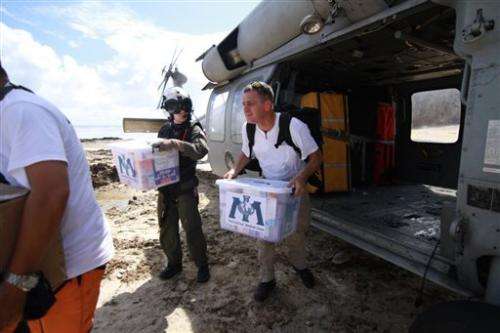
In this Nov. 13, 2013 photo provided by the International Medical Corps, Dr. Robert Fuller, right, chief of emergency medicine at the University of Connecticut Health Center, exits a helicopter with medical supplies in Hermani, Philippines. Fuller was a member of the team from the International Medical Corps that responded to the Philippines after the November 2013 typhoon. Faced with a possible three weeks of quarantine at the end of a six week commitment, Fuller will not likely be able to go to West Africa in 2014 to help with care for Ebola patients. (AP Photo/International Medical Corps, Margaret Aguirre) -
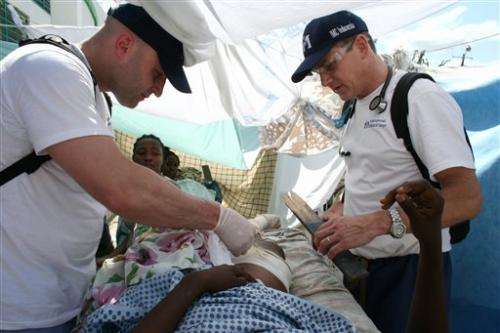
In this Jan. 16, 2010 photo provided by the International Medical Corps, Dr. Robert Fuller, right, joins Dr. Matthew Howell as they care for a person injured in the 2010 earthquake in Port-ua-Prince, Haiti. The additional three weeks quarantine on top the six week commitment requited by the International Medical Corps has forced Fuller to give up on the idea of going to West Africa to care for Ebola patients in 2014. "I'm very sad that I can't go, at this point," said Fuller, who's helping instead by interviewing other prospective volunteers. Nine weeks or more "gets to be a pretty long time to think about being away from your family and being away from your job." (AP Photo/International Medical Corps, Margaret Aguirre)
© 2014 The Associated Press. All rights reserved.















